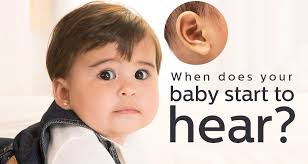Once upon a time, during fetal development at about 20 weeks of gestation, our hearing capacity begins. At this time, we hear the lower tones of our mother’s voice and develop our first recognition of a parent. We also hear internal sounds of our mother’s digestion and other body noises. Because of this connection, it is suggested that the first musical instrument is probably the mother singing to her unborn child. Since the womb is not soundproof, we also hear some low-tone noises from our mother’s environment and these sounds are added to our memories.
At birth, typically at 40 weeks of gestation, our auditory system continues to mature as we learn more about our environment and store new memories. Remarkably, soon after birth, we can recognize our mother’s voice. However, we may not identify our father’s voice until a few weeks later as we gain more experience and voice memories. This demonstrates that hearing is a learned behavior that takes time to develop; it is not automatically present when we are born.
As time goes on, our nervous system matures, and more signals are sent from the ears to the brain. Listening skills-like telling the direction of sound, tolerating sound, hearing in noise, following conversations, and keeping up with fast speech, develop along the way. However, these skills are not completely developed at an adult level until the age of 12. From this point forward, our learning ability, memory support, and auditory skill maintenance continue, and our hearing usually appears seamless.
For most parts of our lives, we may take our hearing for granted. However, for many of us as we reach our 50th birthday, things start to change, and by our 60th birthday, a third of us develop hearing challenges. During this period of change, we gradually lose some of our hearing skills and sound memories. Although we can still hear many sounds, these sounds are not perceived at normal level and some may be completely lost. Most of us may experience problems hearing in noise, have issues with soft speech, ask people to come closer and talk louder, misinterpret words, turn up the TV, not enjoy music, and feel left out of conversations. These changes occur because daily sounds, random noise, and speech communication are primarily driven by the ear and activities within the brain. Hearing drives social engagement, learning, and memory-activities that in turn reduce brain isolation and promote essential cognitive functions. Without daily maintenance of these normal sounds, the brain unwinds what is known. At this stage, the use of hearing devices can help us hear clearer speech and get better sound reception to connect us with our environment. The daily use of hearing aids will naturally retrain some of our important hearing skills, including hearing sounds around us, sounds at a distance, and sounds coming from different directions.
Through this story, we can have a better understanding of how long it took for us to learn and maintain hearing skills and memories and how quickly these skills can be lost. This story can also help us understand why hearing devices can greatly improve our engagement and reduce stress, frustration and isolation. Hearing devices may not resolve all difficulties but they can provide better hearing in most situations and help improve quality of life.
Essential to hearing care is routine hearing checks. Hearing evaluations are covered by insurance and provide an important part of your total health care. To schedule an appointment, give Beth or Jamie a call at (704) 212-2376. More information is available on our website: www.hearingsolutionsofnc.com. Jane and I look forward to seeing you soon.

